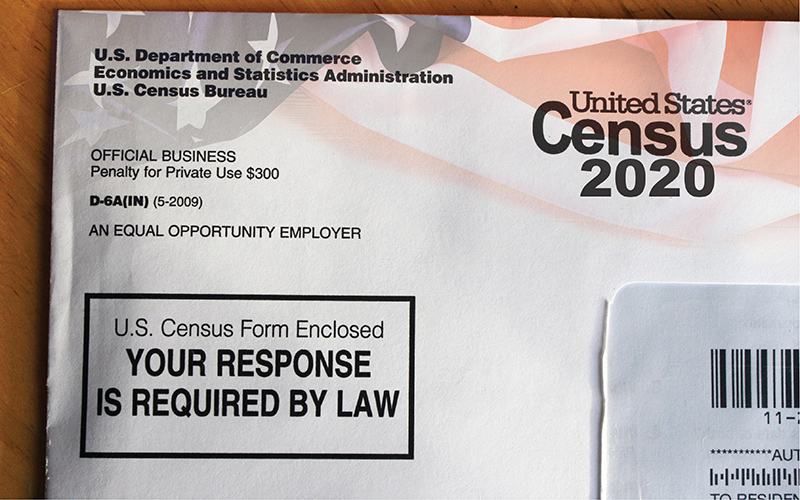
The decennial census, or the 2020 census, takes place every ten years and counts every person and household in the United States. The survey asks general questions about age, race, sex, and others as well as more in-depth questions about ancestry, disabilities, income, and relationships.2 In a process called the congressional apportionment, the 435 seats in the House of Representatives is also divided by the census’ count of the population in all 50 states.3
In early 2019, the Department of Justice asked the Department of Commerce to add the following question to the decennial census:
“Is this person a citizen of the United States?”1
The 2020 Census and Our Voting Rights
The Commerce Department cited the Voting Rights Act (VRA) of 1965 for adding the citizenship question in the 2020 Census. The VRA was enacted to eliminate racial discrimination in voting, specifically banning literacy tests, allowing investigations of state and local poll taxes and providing federal oversight in areas of low voter registration by the non-white population.5,4
According to Secretary of Commerce Wilbur Ross, adding the citizenship question would allow better data collection, broader representation of all races, and consequently a “more effective enforcement of the Voting Rights Act.”6
Critics believe that adding the citizenship question would discourage certain groups from responding to the 2020 census. The Census Bureau’s chief scientist stated that adding the question is “very costly, harms the quality of the census count, and would use substantially less accurate citizenship status data than are available from administrative sources.”6
The Administration fought to have the citizenship question included in the 2020 Census but a New York federal judge ruled against it. Judge Jesse M. Furman ruled that while the question is constitutional, the Commerce Department’s decision to add the question is “arbitrary and capricious” and violated the law by not giving a required three-year notice to Congress.7 The issue was then elevated to the Supreme Court for ruling.8
In July 2019, the Supreme Court ruled against the Commerce Department and blocked the citizenship question from being in the 2020 Census. That same month, the Census Bureau sent the questionnaires to print without the citizenship question for the April 2020 deadline, allowing a more realistic count of everyone in the United States.9
Why is this important for health and healthcare?
Including a question about citizenship status may cause millions of people to either lie or skip the Census altogether. Undercounting these individuals will result in inaccurate citizenship data. Public health research uses population counts as a base to determine disease prevalence, track diseases over time, and monitor social determinants of health.10 Federal funding could also be misallocated if thousands of people are not accounted in their communities.10
What now?
Title 13 of the U.S. Federal Code prohibits the Commerce Department from sharing census data with any other government agency including the Department of Homeland Security Immigration and Customs Enforcement (ICE).1,11 Even with that law in place, countless immigrants still fear the consequences of revealing their citizenship status.
Various organizations are working to address the community’s concerns about the 2020 Census, to strengthen their voices, and to encourage census participation from immigrants and other hard-to-count individuals. For example, the Coalition for Humane Immigrant Rights (CHIRLA) opened outreach offices throughout California to offer support to these communities and to ensure that everyone is counted in this year’s decennial census.12
All US households will receive an invitation to participate in the 2020 Census by April 1, 2020.13
Author bio:
Kaitlin Brehaut, MPH, CHES
Kaitlin Brehaut serves as IHPL’s Health Policy Assistant, providing administrative, programmatic and research support to the Institute team. Ms. Brehaut completed her undergraduate education in Health Science with a concentration in Health Care Management at California State University, San Bernardino (CSUSB). She then received her Master of Public Health degree at CSUSB. She is also certified as a Health Education Specialist.
For more information, contact Kaitlin at: [email protected]
References:
- https://ajph.aphapublications.org/doi/10.2105/AJPH.2019.305196
- https://www2.census.gov/library/publications/decennial/2020/operations/planned-questions-2020-acs.pdf
- https://www.census.gov/topics/public-sector/congressional-apportionment/about.html
- https://www.ourdocuments.gov/doc.php?flash=false&doc=100
- https://www.history.com/topics/black-history/voting-rights-act
- https://www.motherjones.com/politics/2019/04/in-census-case-supreme-court-suddenly-cares-a-lot-about-voting-rights-act/
- https://apnews.com/c39334f65f99465582b49489c5077781?utm_campaign=SocialFlow&utm_source=Twitter&utm_medium=AP
- https://www.vox.com/policy-and-politics/2019/2/15/18226578/census-supreme-court-lawsuit-citizenship-question
- https://www.nytimes.com/2019/07/02/us/trump-census-citizenship-question.html
- https://ajph.aphapublications.org/doi/full/10.2105/AJPH.2019.305074
- https://www.census.gov/content/dam/Census/library/factsheets/2019/comm/2020-confidentiality-factsheet.pdf
- https://caseygrants.org/evn/organizations-urge-everyone-to-be-counted-in-2020-census/?gclid=Cj0KCQiA9dDwBRC9ARIsABbedBMwVXBixmzb61tTb_cWIeT3ceXwtrxL81diOP7mvVvzgj6bmInkCgEaAml4EALw_wcB
- https://2020census.gov/en/important-dates.html

.jpg)